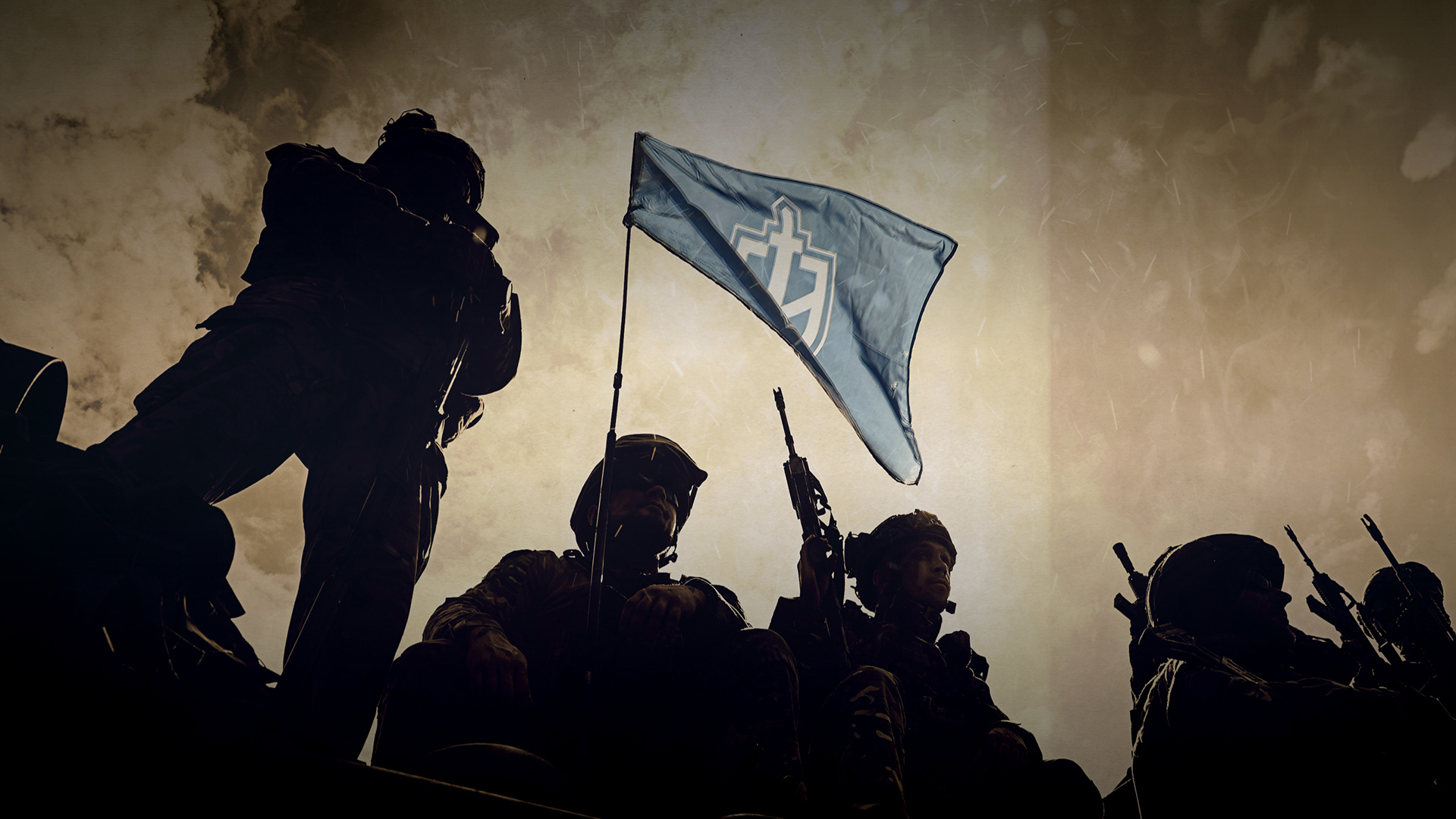The actions of the Russian Volunteer Corps, their relationship with the far-right and connections with Greece
This article, published by iMEdD, is available for republication under a Creative Commons license.
“It looks like RVC fighters are visiting their homeland again! The flames of the struggle are rising!” Accompanying a brief video, this message surfaced on the Telegram encrypted messaging platform on May 22, 2023. In the footage, men, concealing their features and clad in military attire, brandish weapons and a flag, while posing beneath the entrance sign of the Russian village Bezliudovka, signifying their border crossing. That same evening they executed a raid on their native soil – the Belgorod region of western Russia. It was perhaps the largest ground attack on Russian territory since the beginning of the war. Responsibility for the incident has been claimed by two volunteer armed groups— the Russian Volunteer Corps (RVC) and the Freedom of Russia Legion. Comprised of Russian nationalists fighting on the side of Ukraine, these groups lack a clear link to the official government of the country.
Leading the RVC is Denis Kapustin, a Russian figure also known as Denis Nikitin or by the nom de guerre “White Rex.” Kapustin is a founding member of an international far-right network involved in organising mixed martial arts (MMA) fights across multiple countries, including Greece, and appears to play a crucial role in similar formations in Europe and the US.
The Greeks fighting in Ukraine
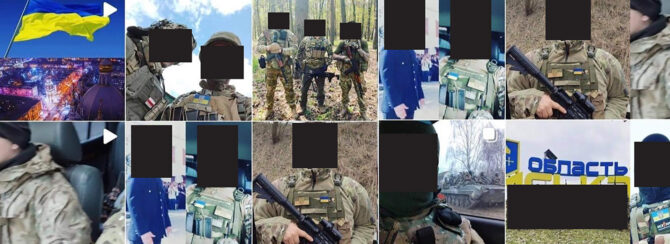
“These days have been difficult. We’ll see…” read the message I received on Signal after an interview request on May 13.
The enemy of my enemy
According to the official RVC website, the main goals of the organisation are to “restore Ukraine’s territorial integrity within its borders as in 1991,” “overthrow the current dictatorship in the Russian Federation,” and “liberate the Russian people”. The organisation considers Russia to be under occupation by Vladimir Putin’s forces and is dedicated to fighting for its liberation.
The RVC was founded in August 2022, as a “military-political formation of Russian volunteers”. The organisation’s founding declaration, as published on its official Telegram channel, states its intention to provide Russian volunteers with the opportunity to fight alongside Ukraine against Putin. Investigative journalist Karim Zidan, who has extensively covered the RVC and its leader Kapustin, provided insights to iMEdD regarding Kapustin’s motives for founding the group: “He initiated the RVC with the intention of overthrowing Putin and creating a Russian nation-state focused on the well-being of so-called ethnic Russians.”
The attack in late May was not the first occasion when Russian volunteer groups ventured across the border, instigating aggressive actions within Russian territory. On March 2, 2023, the RVC claimed responsibility for ground attacks in the Bryansk region of western Russia. The Ukrainian government denied involvement, labelling it a deliberate provocation. According to the organisation, these attacks were intended to distract and reposition Russian military forces, paving the way for a successful Ukrainian counter-attack.
He initiated the RVC with the intention of overthrowing Putin and creating a Russian nation-state focused on the well-being of so-called ethnic Russians
Karim Zidan, Investigative Reporter.
But it is also a battle of perceptions. Kapustin himself has asserted that the purpose of the attacks is to demonstrate the breachability of Russian borders and called on Russians to resist the Putin regime. “Although some of the attacks have had some success, the group’s actions are more of a statement than a serious military threat. The Belgorod attack, for instance, was never intended to annex territory, but to showcase the vulnerability of the Russian military. It also drew attention to their militia, with mainstream media interviewing Kapustin shortly afterward,” Zidan explains. Following the May attack in Belgorod, Kapustin warned of upcoming similar raids. More recently, in late October 2023, RVC fighters participated in the Battle of Avdiivka, in the Donetsk region, alongside the Armed Forces of Ukraine.
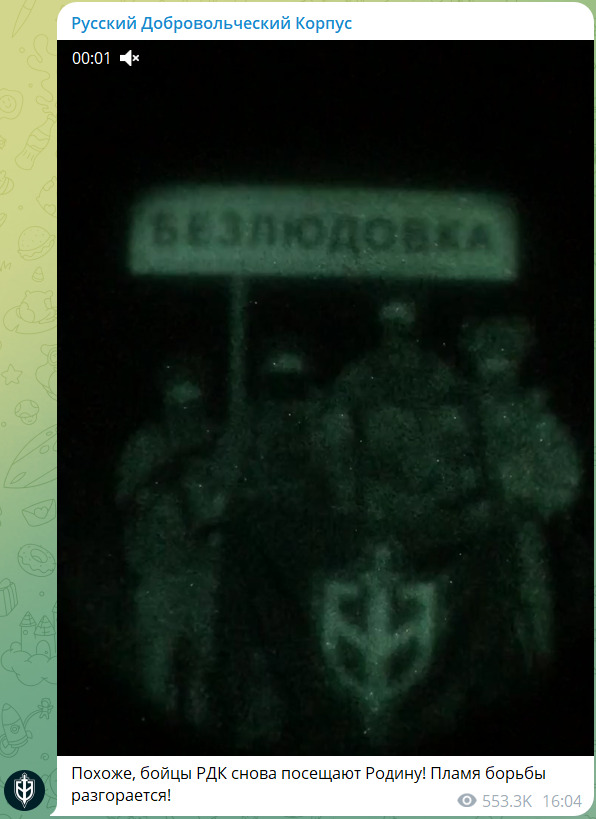
The alleged links with the Ukrainian government
As the organisation itself acknowledges, the RVC is not a component of the Armed Forces of Ukraine. Subsequent to the Belgorod attack in May 2023, Ukrainian military intelligence claimed that the RVC is an independent group operating within Russia’s borders and has a unit in Ukraine’s Foreign Legion – an assertion contradicted by the latter. In post-attack statements, Kapustin claimed that Ukraine’s support is limited to logistical and medical assistance. Within the same statements, Kapustin declared: “The war ends in Moscow”.
“There are two scenarios,” says Alexander Ritzmann, head of the Counter Extremism Project’s office on far-right violence and terrorism, speaking to iMEdD about the RVC’s ties with the Ukrainian government. “Either the Ukrainian government is utilising the actions of these groups as a form of psychological and communication warfare against Putin and Russia – suggesting that a Russian group is invading Russia to free Russians from Putin. Alternatively, Kapustin, who has been living in Ukraine for many years, may have managed to establish personal connections that allow him, unofficially, access to weapons and equipment.”
On December 5, 2023, the day designated as International Volunteer Day, a message of thanks was posted on the official RVC channel on Telegram, “to those without whom it would be impossible to organise the activities of the RVC and any other unit.” Among the organizations and individuals thanked by the group for their financial and organizational contributions, a number of Ukrainian non-profit and voluntary organizations, more or less known for their assistance to Ukrainian voluntary combat units, appear. Interestingly, however, the same list includes “Kvartal 95 Studio”, a well-known television production company in Ukraine, which was established in 2003, and whose founding team included the current President of Ukraine, Volodymyr Zelensky. In fact, when he was elected President in 2019, some former colleagues of his at “Kvartal 95” took up positions within the government as advisors to him. In addition, one of them, who was the head of “Kvartal 95 Studio”, was put in charge of Ukraine’s intelligence services, a role he held from 2019 to 2022.
RVC also thanked the TV channel “Channel 5”, which until 2021 was owned by the former President of Ukraine, Petro Poroshenko.
Trying to establish whether these two entities are in fact related or contributing in any way to the RVC’s actions, iMEdD sent questions via email to both “Kvartal 95 Studio” and “Chanel 5”, regarding the above publication on the Telegram platform and the mention of them by the RVC in their list of supporters. As of the day of publication we have not received any response.
The shadowy world of Telegram hooligans
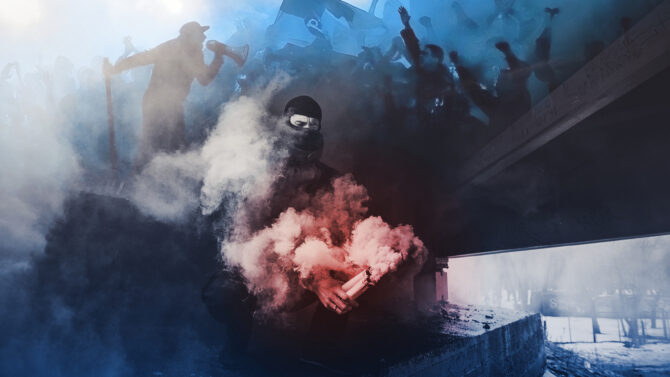
The Bad Blue Boys, hooligans associated with Croatian club Dinamo Zagreb, have links to organized fans from Ukraine and Greece. An in-depth investigation conducted by iMEdD delved into numerous public channels and social media profiles to uncover the connections between organized fans from Croatia, Ukraine, and Greece, as well as their affiliations with far-right ideologies.
The “White Rex”
Fifteen years prior to the Belgorod attack, Kapustin played a central role in an international network of far-right groups involved in organising mixed martial arts (MMA) fights. In 2008, he established the clothing brand White Rex, which was identified by the NGO Anti-Defamation League as promoting white supremacy. Soon after, he started organising tournaments in provincial Russian cities, and expanded internationally, hosting events in countries like Italy, Ukraine, France, and Hungary.
By organising MMA tournaments and establishing his clothing brand, Kapustin aimed to construct an entire lifestyle—a distinct culture centred around sport, healthy living, and far-right political views as its primary pillars. This endeavor appears to have garnered imitators, with the likes of American Robert Rundo, founder of the racist and pro-white supremacy group Rise Above Movement, emerging as a key figure in this trend.
Kapustin himself seems to have been actively involved in the Russian and German hooligan scenes. In the wake of the RVC attack in Bryansk in March 2023, one of the largest far-right hooligan Telegram channels, with more than 20,000 followers, referred to Kapustin as a “white race hero” and to White Rex as “a combat sports scene for white nationalists and fascists across Europe.” This specific post garnered almost 50,000 views. “I would say he is one of the most well-known and important violent far-right extremists in Europe,” Ritzmann says. In 2019, Germany prohibited Kapustin from entering the Schengen zone due to his actions “against the liberal democratic constitution.”
I would say he is one of the most well-known and important violent far-right extremists in Europe
Alexander Ritzmann, head of the Counter Extremism Project’s office on far-right violence and terrorism.
Rundo and Kapustin co-hosted the “Active Club” podcast, offering guidance on establishing small local far-right cells and participating in combat sports, with an emphasis on preparedness for coordinated and potentially violent street actions. The resonance of their messages led to the formation of the international far-right network “Active Club,” under Rundo’s leadership. According to a September 2023 report by Alexander Ritzmann in the Counter Extremism Project, the Active Club is now considered the fastest-growing and most dangerous network of far-right and white supremacist activists. It boasts at least 46 cells in 14 European countries, 12 in Canada, and another 46 in 34 U.S. states. The same report indicates that members from France and Estonia are actively involved in war fronts in Ukraine. Rundo, who was arrested in Romania last March, has been extradited to the U.S. and faces charges of conspiracy and inciting violence at California political rallies in 2017.
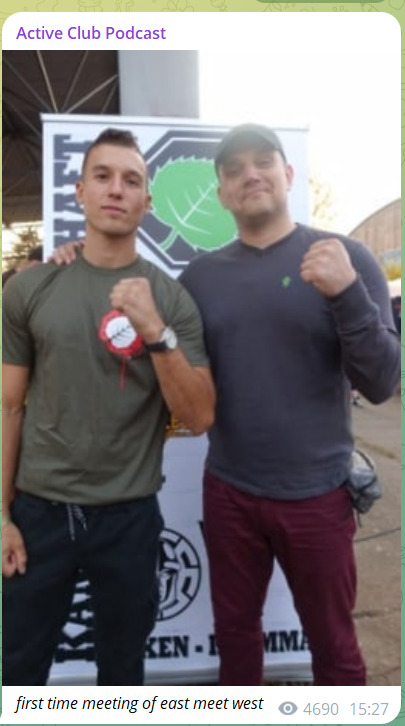
Kapustin, like Rundo, also established connections in Greece, having visited the country at least once. Reports suggest that he organised a mixed martial arts tournament in Greece, and he can be seen in a video shared by a Greek far-right group on YouTube in 2015. The video was posted on the channel of Propatria, an organisation modeled after Golden Dawn, with its members facing arrests and convictions for violent attacks on political opponents. Members and supporters of Propatria are alleged to have played a significant role in the violent incidents at the Monastiraki metro station in central Athens on November 1, 2023. The same Greek group expressed gratitude to Kapustin for organising festivals, during which many participants don White Rex clothing. Kapustin’s presence in Greece in 2015 was corroborated by Zidan, who added that Propatria was an ally of Kapustin and part of his international far-right network.
Western type weaponry
During the RVC attack in Belgorod, videos and photos shared on Telegram reveal fighters using armoured vehicles allegedly manufactured in the US within Russian territory, sparking immediate reactions. These vehicles were originally supplied to Ukraine by the US for defense against the Russian invasion. The Ukrainian army’s intelligence services deny providing the Russian fighters with this equipment or having any direct involvement in the attack. Kapustin, in his statements, did not offer clear answers regarding how these vehicles came into possession of his group. According to the Washington Post, Russian volunteers also employed Czech and Belgian weapons during the May attack. The Prime Minister of Belgium has urged Ukrainian authorities to investigate the matter, emphasising that the weapons provided by his country are intended for defensive use in support of Ukrainian territory. In statements, a State Department spokesperson stressed that the US does not endorse the use of military equipment provided to Ukraine for strikes within Russian territory.
Even before the establishment of the RVC, Kapustin, along with other members of the group, shared online photos showcasing themselves with state-of-the-art Swedish and British anti-tank weapons. Notably, in a photo posted on Kapustin’s Instagram account, he is seen posing in Kiev, holding an NLAW-type anti-tank weapon manufactured by Sweden and Great Britain. This photo was uploaded in June 2022, before the official formation of the RVC. “This could mean he has personal connections with individuals who have access to these weapons,” Ritzmann says.
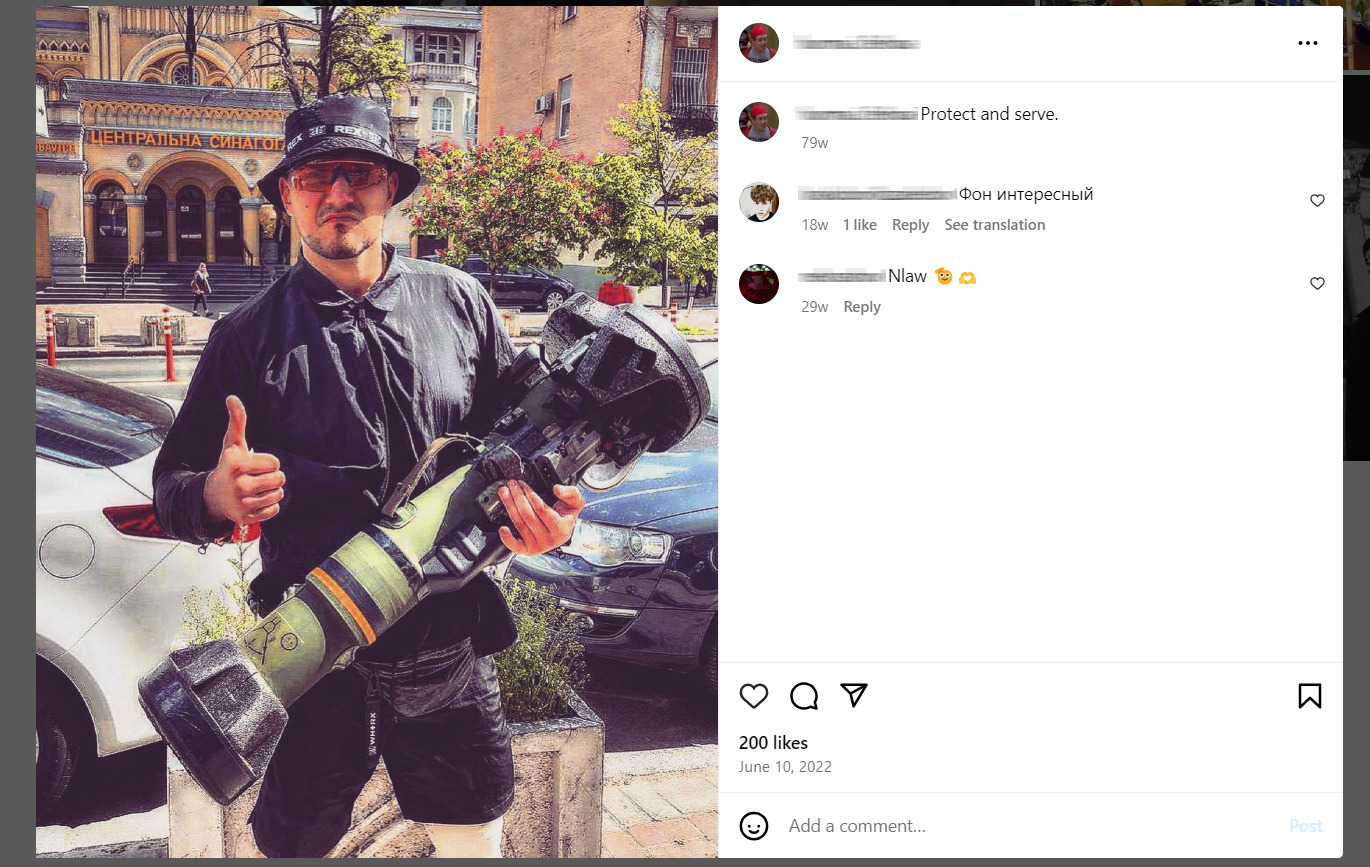
Online recruiting
On his personal Telegram channel, boasting more than 27,000 followers, Denis Kapustin shared a photo on December 10, 2023, displaying a series of Russian passports. In the accompanying description, he announces the arrival of new volunteers in Ukraine, aligning with the RVC. As he claims, his group has gained new members in its ranks, including veterans from the Russian mercenary group Wagner, who decided to switch sides. In late October, a video surfaced on the same Telegram channel, featuring Kapustin addressing Russian prisoners of war in the courtyard of a prison-like building amid pouring rain. In this speech, he invites them to join the ranks of his unit. The website and the RVC’s Telegram channel offer a voluntary recruitment service specifically targeting “ethnic Russians regardless of nationality.” The application process involves completing a form that includes questions about the candidates’ origin, political views, and physical condition.
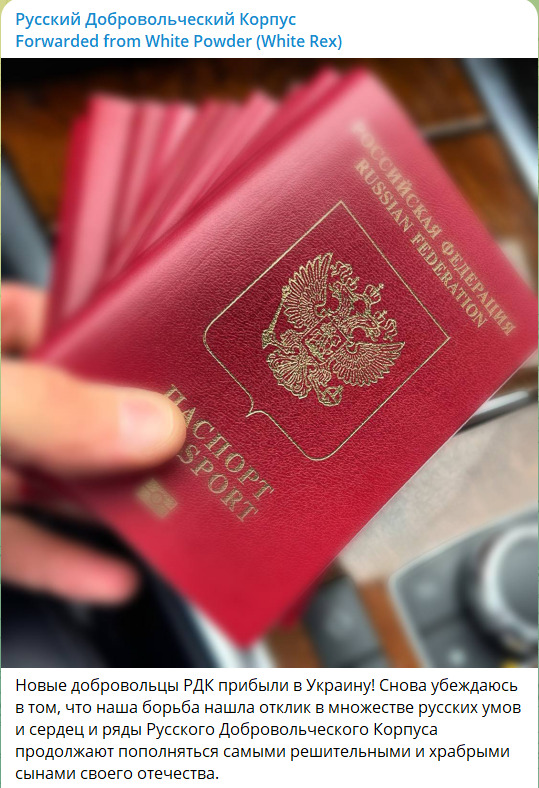
According to Ritzmann, Kapustin “has exported his ideas and practices to several countries, actively contributing to the formation of violent far-right activist networks.” This is particularly alarming given his role as the leader of the RVC in the Ukrainian war, where he has access to weapons and trained soldiers. “Yet, once the conflict in Ukraine ends, these individuals may find themselves purposeless and unemployed,” he notes. What does Ritzmann foresee for the organisation after the war? “I can imagine different scenarios, including their involvement in activities like arms trafficking and orchestrating attacks against their opponents, whether they are liberals, feminists, Jews, Muslims, the LGBTQ+ community or any other targeted group. This is the danger when one of the most significant far-right extremists acquires an operational army,” he concludes.
